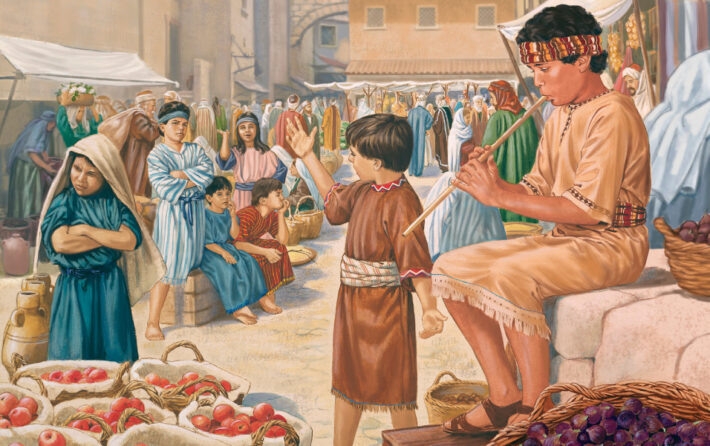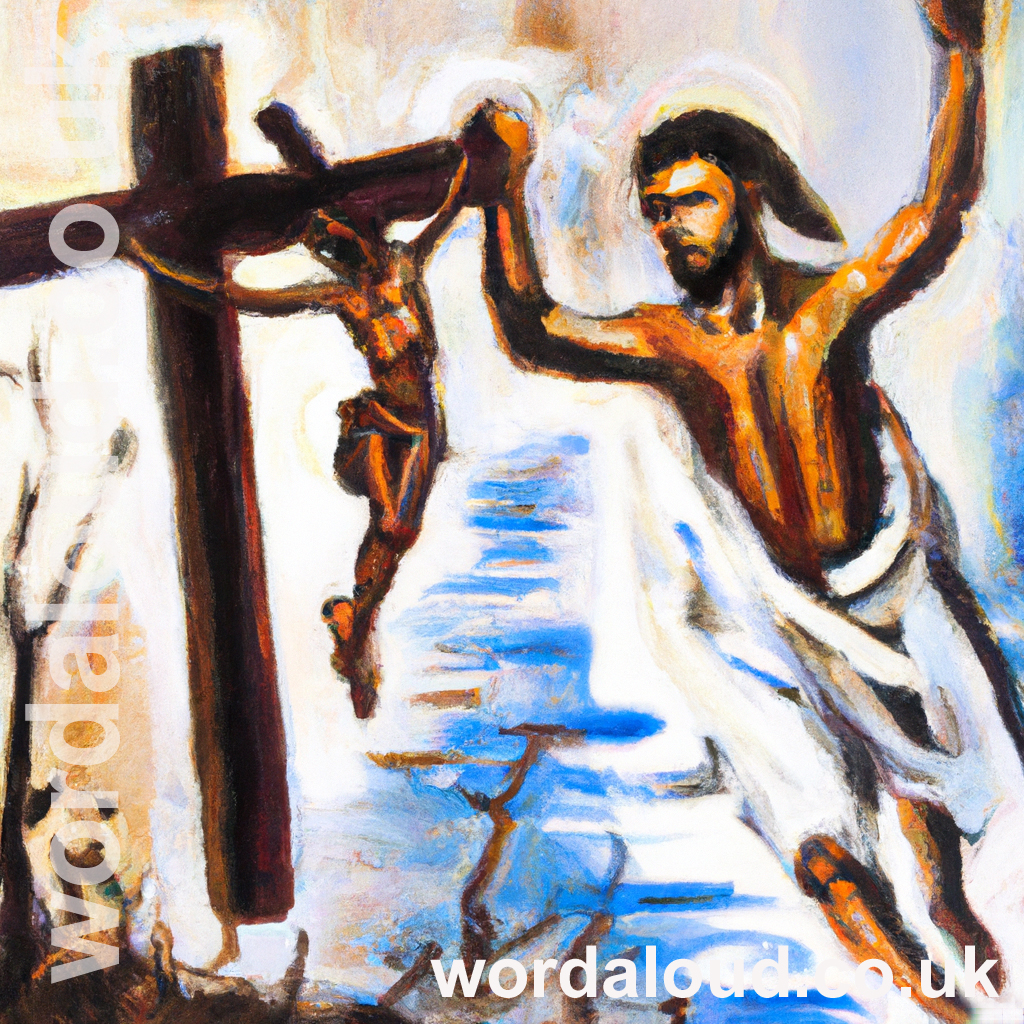Christian Art | Like Children Sitting In The Marketplace
Luke 7: 31-35 – Week 24 Ordinary Time, Wednesday (King James Audio Bible KJV, Spoken Word)
31 ¶ And the Lord said, Whereunto then shall I liken the men of this generation? and to what are they like?
32 They are like unto children sitting in the marketplace, and calling one to another, and saying, We have piped unto you, and ye have not danced; we have mourned to you, and ye have not wept.
33 For John the Baptist came neither eating bread nor drinking wine; and ye say, He hath a devil.
34 The Son of man is come eating and drinking; and ye say, Behold a gluttonous man, and a winebibber, a friend of publicans and sinners!
35 But wisdom is justified of all her children.
There is such over-flowing of goodness and joy in our response to Jesus. Faced with such overwhelming power of truth, it is paradoxically to be expected that people will object. We may all have felt a certain closing off at times, a rejection of what might be best in favour of what we know and are accustomed to. Too many of the people of Jesus’ time look set to reject him, just because of who he is and what he represents – i.e. the truth and the new and better way – rather than because of all that he says and does. These people seek evil where there is only good.
Jesus calls to the people who reject him and Jesus terms their attitude childish. These people are like spoilt children. They call for this and that and do not know what they really want. John the Baptist came and lived a highly ascetic life, and they said he had a devil. Jesus comes eating and drinking – and that’s bad too!
It might be said that much is wrong when people have become so stuck in a limited position of lack and resentment and poverty and suspicion that they have ceased prayer and cornered themselves and hate all better ways. We might now term this a parochial attitude, always ready to tramp on hope. Much of our media, for example some tabloid newspapers, plays to and reinforces this attitude of rejection and hate. As Christians, as humanity, we are called to be better.
Wisdom is justified of her children. Wisdom is truth and blessedness. We are asked to be with God’s law and God’s truth. No matter hatred and adversity, we can give ourselves to God such that love will shine through us. Additionally, we need not be afraid. Even when it might seem embarrassing to express God’s love or our sense of our personal calling by God, still we can still express our relationship with God, with Jesus, and others do respond. A lot of people in this world are afraid and just waiting for reassurance that they too can express truth, which means to say love, God. Enough of the time clowning as children in the marketplace. Wisdom will be justified by her children.
Concluding Prayer | Love Revealed By Jesus Christ
On the cross, Lord Jesus Christ,
you stretched out your hands for the salvation of the human race;
grant that our life and work
may be pleasing to you
and bear witness to the power of your redeeming love.
Who live and reign for ever and ever.
![]()

King James Audio Bible | Endnotes
Like Children Sitting In The Marketplace
The marketplace was a bustling hub of activity in ancient times, a place where people came to buy and sell goods, socialize, and exchange ideas. Children often played in the marketplace, but they were also expected to help their parents with their businesses. In this context, the children that Jesus speaks of are not simply innocent bystanders, but active participants in the marketplace culture.
When Jesus compares the people of his generation to these children, Jesus is highlighting their fickleness and lack of discernment. Just as the children in the marketplace call out to each other, demanding that they dance or mourn according to their whims, so too do the people of Jesus’ time make demands of their leaders based on their own desires and expectations. John the Baptist, for example, lived an ascetic lifestyle, abstaining from rich foods and wine, and preaching a message of repentance. Yet some accused him of having a devil. Jesus, on the other hand, ate and drank with sinners, and was accused of being a glutton and a drunkard.
What Jesus is saying here is that the people of his generation are like children who cannot appreciate the wisdom of those who come to teach them. They demand to be entertained and catered to, rather than listening to the words of those who are trying to guide them towards a deeper understanding of God’s will. This lack of discernment is not unique to Jesus’ time, but is a recurring theme throughout the Bible.
In the Old Testament, we see numerous examples of people who fail to listen to the wisdom of the prophets and leaders that God sends to them. The Israelites, for example, repeatedly turned away from God and followed after false idols, despite the warnings of Moses and other prophets. In the New Testament, the Pharisees and other religious leaders are often depicted as being more concerned with their own power and status than with following the teachings of Jesus.
Throughout Christian history, theologians and religious leaders have drawn upon this passage to criticize the fickle nature of the human heart. Saint Augustine wrote that ‘the children of wisdom are those who listen to God’s word with sincere hearts and obedient wills’. Martin Luther, the Protestant reformer, saw the passage as a warning against those who twist the gospel to their own purposes, writing that ‘they who cannot receive the gospel, will hear nothing of it, however it may be preached’.
In more recent times, scholars have pointed out the relevance of this passage to our contemporary culture, where people are often more interested in being entertained than in seeking out wisdom and understanding. The German theologian Dietrich Bonhoeffer wrote that ‘the superficiality of our time is reflected in the fickleness of our opinions, which are constantly shifting with every new idea that catches our attention’.
Ultimately, what Jesus is saying in this passage is that wisdom will be justified by her children. In other words, those who truly seek wisdom and understanding will recognize it when it is presented to them, even if it is not what they expected or wanted to hear. This idea is echoed in other parts of the Bible, such as in Proverbs 8:17, which says ‘I love them that love me; and those that seek me early shall find me’.
The image of children sitting in the marketplace in Luke 7:31-35 is a metaphor for the fickleness and lack of discernment that can be found in human nature. It is a warning against the dangers of demanding to be catered to, rather than seeking out wisdom and understanding.
What Does Jesus Mean That Wisdom Is Justified Of Her Children?
The context of this statement ‘wisdom is justified of her children’ is Jesus’ comparison of the people of his generation to children sitting in the marketplace, who are fickle and unable to appreciate the wisdom of those who come to teach them. Jesus contrasts this with the idea that wisdom is justified by her children, which is a statement that has been interpreted in various ways by biblical scholars and religious authorities throughout the ages.
At its simplest level, the phrase ‘wisdom is justified of her children’ means that those who truly seek wisdom and understanding will recognize it when it is presented to them. In other words, those who are ‘the children of wisdom’ will be able to recognize and appreciate true wisdom, even if it is not what they expected or wanted to hear. This is a call to humility and openness to new ideas, as well as a reminder that true wisdom often requires effort and commitment to understand.
Some biblical scholars have interpreted this phrase to mean that wisdom is proven to be true and valid by the actions and beliefs of those who follow it. In other words, the children of wisdom are those who live according to its principles, and their lives serve as a testimony to the validity of wisdom. This interpretation is consistent with the idea that true wisdom is not merely an intellectual pursuit, but a way of life that is reflected in our actions and choices.
Others have interpreted the phrase ‘wisdom is justified of her children’ to mean that wisdom is vindicated by those who believe in it, even in the face of opposition or persecution. In this interpretation, the children of wisdom are those who remain faithful to its teachings, even in the face of adversity. This idea is consistent with the biblical theme of the righteous being persecuted for their beliefs, as well as with the idea that true wisdom often requires courage and perseverance in the face of opposition.
The phrase ‘wisdom is justified of her children’ has also been interpreted as a reference to the ultimate judgment of God. In this interpretation, the children of wisdom are those who will be vindicated at the final judgment, when God will separate the righteous from the wicked. This interpretation emphasizes the importance of living a life that is consistent with the teachings of wisdom, and the belief that ultimately, God will reward those who have lived according to his principles.








